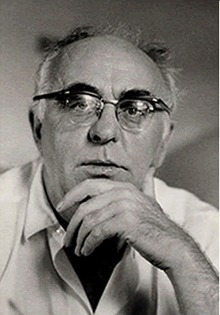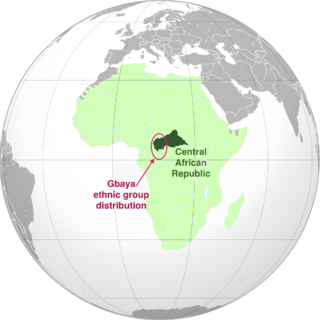Related Research Articles

Charles Olson was a second generation modern American poet who was a link between earlier figures such as Ezra Pound and William Carlos Williams and the New American poets, which includes the New York School, the Black Mountain School, the Beat poets, and the San Francisco Renaissance. Consequently, many postmodern groups, such as the poets of the language school, include Olson as a primary and precedent figure. He described himself not so much as a poet or writer but as "an archeologist of morning."
Linguolabials or apicolabials are consonants articulated by placing the tongue tip or blade against the upper lip, which is drawn downward to meet the tongue. They represent one extreme of a coronal articulatory continuum which extends from linguolabial to subapical palatal places of articulation. Cross-linguistically, linguolabial consonants are very rare, but they do not represent a particularly exotic combination of articulatory configurations, unlike click consonants or ejectives. They are found in a cluster of languages in Vanuatu, in the Kajoko dialect of Bijago in Guinea-Bissau, and in Umotína, Hawaiian Creole English and as paralinguistic sounds elsewhere. They are also relatively common in disordered speech, and the diacritic is specifically provided for in the extensions to the IPA.

Mançur Lloyd Olson Jr. was an American economist and political scientist who taught at the University of Maryland, College Park. His most influential contributions were in institutional economics, and in the role which private property, taxation, public goods, collective action, and contract rights play in economic development.

Greggory William Olson is a former Major League Baseball relief pitcher who played with the Baltimore Orioles (1988–93), Atlanta Braves (1994), Cleveland Indians (1995), Kansas City Royals, Detroit Tigers (1996), Houston Astros (1996), Minnesota Twins (1997), Arizona Diamondbacks (1998–99) and Los Angeles Dodgers (2000–01). Olson is the Orioles' all-time saves leader with 160 saves.
Tama are a non-Arab, African ethnic group of people who live in eastern Chad and western Sudan. They speak Tama, a Nilo-Saharan language. The population is 200,000–300,000 people and they practice Islam. Many Tama are subsistence farmers who live in permanent settlements and some raise livestock. In the civil war in Chad (2005–2010) the Tama were involved in ethnic conflicts with the Zaghawa tribe.
The Avikam are an Akan people who live predominantly in Ivory Coast.

The Gbaya, also Gbeya or Baya, are a people of western region of Central African Republic, east-central Cameroon, the north of the Republic of Congo, and the northwest of the Democratic Republic of Congo. Numbering about 970,000 by the late 1800s, they originated in northern Nigeria. The Gbaya were known for their strong resistance to the French and slavery, and revolted against them for three years starting in 1928 when they were conscripted to work on the Congo-Ocean Railway.

Anonymous is a decentralized international activist/hacktivist collective/movement that is widely known for its various cyber attacks against several governments, government institutions and government agencies, corporations, and the Church of Scientology.
The Motilon, or Bari, are an indigenous people who live in the Catatumbo River basin in Norte de Santander Department in Colombia in South America. They are descendants of the Tairona culture concentrated in northeastern Colombia and western Venezuela.
The Akuapem are one of the main ethnic groups of the Akan people living in Ghana. They mostly reside south of the Eastern Region of Ghana, i
The Attie are an Akan people who live predominantly in Ivory Coast.
The Avatime are an Akan people who live in Volta region of Ghana. History has it that they are Ahanta people who migrated to the Volta region.
The Ahafo are an Akan people who live in Ghana.
The Assin are an ethnic group of the Akan people who live in Ghana. The Assin people live predominantly in the Central Region of Ghana. The capital of the Assin district is Assin Foso.
The Abidji are an Akan people who live in the Ivory Coast.
The Hemba people are a Bantu ethnic group in the Democratic Republic of the Congo (DRC).
The Ana people, also known as the Atakpame people, are an ethnic group of Benin and Togo. The Ana are concentrated between Atakpame, primarily in the Gnagna and Djama quarters, as well as between Atakpame and Sokode and down to the Togo-Benin border. Ethnologists identify the Ana as the most western of the Yoruba subgroups. In fact, the Ana trace their origins to Ife, and their language is also called Ife, which has about 210,000 speakers.
An ultra light displacement boat is a modern form of watercraft with limited displacement relative to the hull size.
The possibility of further speed increase [...] will always attract ardent believers in their speed virtues, just as they have done in the past. The ULDB are, however, very capricious creatures in terms of performance. They may deliver the goods, provided there is just a right kind of wind and from the right direction to sail 'full and by'. And since weather is also capricious, the ULDB and weather seldom suit each other. 'Light displacement craft', Davidson remarked, 'are not new in principle'. For many centuries there have been canoes, proas and the like in the South Pacific and other places, with similar displacement in proportion to the sail area and hull length. Racing dinghies, or dinghy-like modern offshore racers, so common today, are typical examples of the same principle. In all instances the combination of the major design features: displacement, sail area, length and stability [i.e. —] power to carry sails effectively, is radically different from the combination found in the traditional seaworthy and wholesome yachts.
The Soungrougrou is a river of Senegal. It is a tributary of the Casamance River, and joins the river at Adéane. The river passes north from the Casamance, stretching to Vintang-Geregia. During the 19th century it was used by cotton traders, though the trading centres along the river were later abandoned. The river is inhabited by the Jola people, half of whom are Muslims. The small town of Marsassoum lies on the bank of the Soungrougrou.
The Beytussebab rebellion was the first Kurdish rebellion in the modern Republic of Turkey. The revolt was led by Halid Beg Cibran of the Cibran tribe. Other prominent commanders where Ihsan Nuri and Yusuf Ziya Bey. Its causes laid in opposition to the abolition of the Ottoman Caliphate in 1923, the repressive Turkish policies towards Kurdish identity, the prohibition of public use and teaching of the Kurdish languages, and the resettling of Kurdish landowners and tribal chiefs in the west of the country. Numerous officers of the Turkish army deserted for the rebellion. The rebellion began in August 1924, when the garrison of Beytüşşebap revolted against the Turkish government. The rebellion proved unsuccessful, and ended shortly after it began. Yusuf Ziya Bey was arrested on the 10 October 1924 and reportedly accused Halid Beg Cibran of having been also involved in the revolt. Halid Beg Cibran was captured in Erzurum in December 1924. Both were courtmartialed in Bitlis. Although the rebellion was suppressed, another Kurdish uprising, the Sheikh Said rebellion, would begin the next year.
References
- ↑ Olson 1996, p. 171.
- Sources
- Olson, James Stuart (1996). The peoples of Africa: an ethnohistorical dictionary. Santa Barbara, CA: Greenwood Press. p. 171. ISBN 978-0-313-27918-8. OCLC 32968738 . Retrieved 18 April 2010.
| | This Ghana -related article is a stub. You can help Wikipedia by expanding it. |
| | This Ivory Coast-related article is a stub. You can help Wikipedia by expanding it. |